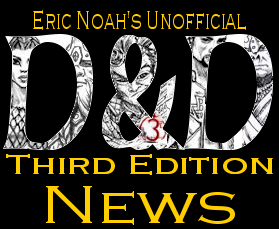|
Did Gary Gygax just "get lucky" with the success of the Dungeons & Dragons game? Did Wizards of the Coast just "get lucky" with their successful trading card game, Magic: The Gathering? Here's a letter posted to DND-L on May 31, 2000, by Ryan Dancey, VP of WotC and Brand Manager for Dungeons & Dragons: In the case of both the early evolution of roleplaying games with D&D, and the creation and development of Magic, luck played a relatively minor role. Neither game would have been successful had it merely been "a good idea". There are good ideas in gaming all the time. The difference in both cases was a management team able and willing to take tremendous personal risks in order to establish a market presence and develop a network of consumers when confronted with a good idea. My dad always taught me that "luck" is when opportunity meets preparedness. In both cases, the people involved were actively looking for good opportunities, and moved very quickly to capitalize when they found one. I can't speak in great detail about the primordial conditions of roleplaying games, but I have direct personal knowledge about the state of Wizards of the Coast prior to the release of Magic. I had been friends with Peter [Adkison, CEO of WotC] for some time, having met him in 1990 through my activities as the organizer of a local gaming convention. Peter had already by that time established a roadmap to grow Wizards from a small niche publisher into a more substantial company. Lisa Stevens was hired in early 1991 or 1992 to direct the company through those initial growth pangs; her experiences at Lion Rampant and White Wolf were vital to laying the groundwork for what would come later. Peter was actively seeking for game play opportunities that were unique and could be exploited in the hobby gaming business. That search lead eventually to Mike Davis who represented Richard Garfield. The original game Mike and Richard pitched to Peter was RoboRally; and though Peter recognized that the game had potential, he also realized that Wizards couldn't do much with it at its current size. The apocryphal story is that the discussion took place waiting in line to enter the Masquerade at OryCon in Portland, OR. According to the legend, Peter asked Richard for a game that was portable, could be played sitting in lines at conventions, and featured classic fantasy archetypes. The result was Magic, and during the playtest period which lasted nearly two years, the game went through tremendous revision. During that time, the team at WotC worked with Richard to make the game better - using their own knowledge of what would sell and what kinds of things gamers would look for in this new format. That the team came so close to perfect in this regard was no accident - these people were actively seeking out feedback, researching businesses like sports cards and art cards, and did more than their fair share of homework. The real difference between "luck" and the success Wizards eventually earned came after the release of the first print run of Magic. In the gaming business at that time, a success at the level of Magic's first print run would have catapulted WotC into the 2nd tier of companies; FASA, Palladium, White Wolf, Steve Jackson, et al. For essentially everyone in the business, that would have been considered a spectacular success. But Peter and the Wizards team were not satisifed with stopping at that point. In a gamble unprecedented in the gaming business up to that point, WotC risked everything they had accomplished, incurred tremendous debt (secured by personal assets), and went back on press to produce more cards. The result was the ability to tap the fast growing Magic market in time to maintain the momentum and transform the gaming industry forever. After that second round of debt financing, WotC's cash flow was sufficient to allow the company to grow without additional debt for a long, long time; and that cash flow engine was used to catapult the business past TSR and Games Workshop and into the marketshare leading position WotC still enjoys to this day. In addition to this particular combinatin of market savvy, product knowledge, and ability to manage risk, Peter also turned out to be a pretty good CEO. The history of business is littered with companies who got a good idea, built a market, and then flamed out spectacularly when the initial market development stalled. Peter and the management team he assembled not only created a new category of gaming, they grew a company from nothing to more than $100M in annual revenue in just three years, didn't incurr any substantial debt, funded the development of a worldwide sales and player support network, and attempted to diversify into many other game categories; and while most of those attempts failed from the standpoint of WotC, they would have been considered very successful as start up ventures in their own rights. It is easy to look at WotC from the standpoint of a consumer and imagine that Magic just happened and that anyone could have obtained the same results given the same starting conditions. My experience in the gaming business both as an entreprenuer and as a part of the WotC staff tells me unequivocally that such a theory is inaccurate. What Peter and the early WotC staff accomplished is a testament not to luck, but to dogged perserverence, vision, and great intestinal fortitude. Dungeons & Dragons, D&D 3E and AD&D are all property of Wizards of the Coast. |
